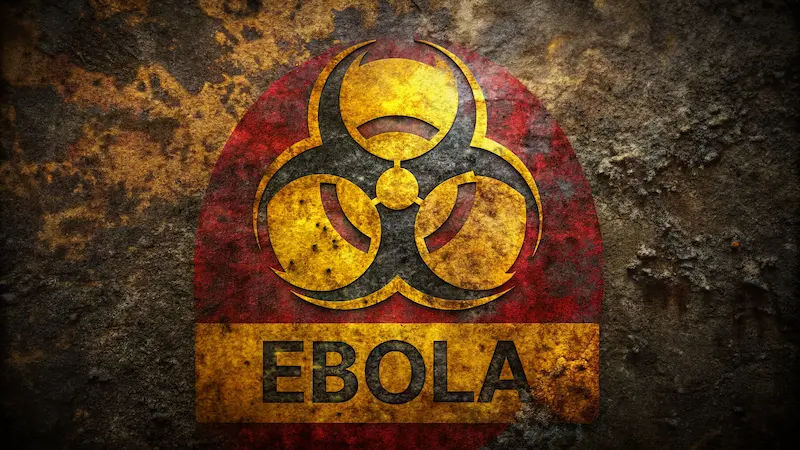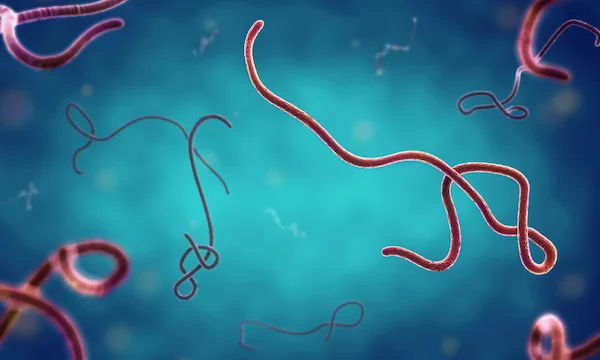Ebola Virus: A Realistic Guide to the Threat and How to Stay Safe
Demystify the Ebola virus threat. Learn how Ebola spreads, its symptoms, and effective prevention strategies. This guide separates fact from fiction to help you stay safe.

Written by Dr. Mohammed Kamran
Reviewed by Dr. Dhankecha Mayank Dineshbhai MBBS
Last updated on 18th Sep, 2025

The word "Ebola" often conjures images of headlines announcing outbreaks and Hollywood-style pandemics. This sensationalism can create a climate of fear and misunderstanding. But what is the real Ebola virus threat to the average person? The truth is, while Ebola Virus Disease (EVD) is a severe and often fatal illness, its mode of transmission makes it a limited threat to the general public outside of specific outbreak conditions. This guide aims to demystify the ebola virus, separating fact from fiction. We will explore how it spreads, its symptoms, and the concrete steps you can take to protect yourself. Knowledge, not fear, is our most powerful tool in understanding and mitigating any public health threat.
What Exactly is the Ebola Virus?
Ebola virus disease (EVD), formerly known as Ebola hemorrhagic fever, is a rare but severe illness in humans caused by the Ebola virus. It was first identified in 1976 near the Ebola River in what is now the Democratic Republic of the Congo. The virus is part of the Filoviridae family and is known for its high fatality rates in past outbreaks, which have varied from 25% to 90%.
A Brief History of Ebola Outbreaks
Since its discovery, Ebola has caused intermittent outbreaks, primarily in remote villages in Central and West Africa near tropical rainforests. The largest outbreak in history occurred in West Africa from 2014-2016, involving urban and rural settings and resulting in over 11,000 deaths. This outbreak highlighted the critical need for a robust global public health response. More recent, smaller outbreaks in the DRC and elsewhere have been managed more effectively with new tools like vaccines.
Understanding the Different Ebola Virus Species
Not all Ebola viruses are the same. There are six known species, but only four are known to cause disease in humans: Zaire ebolavirus, Sudan ebolavirus, Tai Forest ebolavirus, and Bundibugyo ebolavirus. The Zaire species is the most deadly and has been the cause of the largest outbreaks. The Reston species can infect humans but does not cause illness, while the Bombali species has been found in bats but has not yet been detected in humans.
How Does the Ebola Virus Spread? Debunking the Myths
Understanding transmission is key to dismantling fear. The ebola virus threat is often exaggerated due to misconceptions about how contagious it is.
Primary Transmission: Contact with Infected Bodily Fluids
Ebola is not an airborne virus. It spreads through direct contact with the blood, secretions, organs, or other bodily fluids of infected people or animals. This typically occurs when broken skin or mucous membranes (in the eyes, nose, or mouth) come into contact with these fluids. Transmission often happens in care settings when family members or healthcare workers care for the sick without adequate protection or during burial ceremonies that involve direct contact with the body of the deceased.
What Doesn't Spread Ebola? Air, Water, and Casual Contact
This is the most important myth to bust. You cannot get Ebola from:
- Air: It is not spread through the air by coughing or sneezing.
- Water: It is not spread through water (like swimming pools) or food.
- Casual Contact: You cannot get it from sitting next to someone or talking to an asymptomatic person on a bus or plane. A person is only contagious after they begin to show symptoms of ebola virus.
Consult Top Specialists
Symptoms of Ebola Virus Disease (EVD)
The incubation period—the time from infection to onset of symptoms—is between 2 to 21 days. A person cannot spread the disease during this incubation period.
Early Stage Symptoms (Days 2-21)
The onset is sudden and often flu-like, making early diagnosis challenging. Key early signs of ebola include:
- High fever
- Severe headache
- Muscle pain and weakness
- Fatigue
- Sore throat
Severe and Late-Stage Symptoms
As the disease progresses, more severe symptoms can develop:
- Vomiting and diarrhea
- Rash
- Impaired kidney and liver function
- In some cases, both internal and external bleeding (e.g., from gums or in stool)
How is Ebola Diagnosed and Treated?
Diagnostic Tests and Procedures
Diagnosing Ebola based on symptoms alone is difficult. Confirmation requires laboratory testing. The preferred method is Reverse Transcriptase Polymerase Chain Reaction (RT-PCR) testing, which detects the virus's genetic material. These tests are conducted under maximum biological containment conditions. If you have a sudden high fever and have recently traveled to a known outbreak area, it is crucial to seek immediate medical attention and inform them of your travel history.
Supportive Care and Emerging Therapies
There is no proven, specific cure for Ebola. Treatment is primarily supportive care, which significantly improves survival rates. This includes:
- Providing fluids and electrolytes orally or intravenously.
- Maintaining oxygen status and blood pressure.
- Treating other infections if they occur.
Two monoclonal antibody treatments, Inmazeb and Ebanga, have been approved for treating EVD caused by the Zaire ebolavirus species. Furthermore, the Ervebo vaccine has been highly effective in protecting against this species and is used in ring vaccination strategies around new cases to contain outbreaks. If you suspect exposure and develop symptoms, consult a doctor immediately. For initial advice, you can connect with a healthcare professional online via Apollo24|7 for guidance on next steps.
Protecting Yourself: Practical Ebola Prevention Strategies
For Healthcare Workers and Those in Outbreak Zones
This group is at the highest risk. Prevention focuses on:
- Strict use of personal protective equipment (PPE) (masks, gloves, gowns, goggles).
- Practicing proper infection control and sterilization.
- Safe burial practices for victims.
- Vaccination with Ervebo for frontline workers.
For the General Public: Assessing Your Actual Risk
For most people not living in or traveling to an active outbreak area, the risk is extremely low. The best ebola virus prevention tips are:
- Stay informed about travel advisories from the WHO or CDC.
- Avoid traveling to areas with known active outbreaks.
- Practice good hygiene, like frequent handwashing with soap and water.
- Avoid contact with blood and bodily fluids of any person who is sick.
- Avoid handling items that may have come into contact with an infected person’s blood or fluids.
The Global Response: Containing an Ebola Outbreak
Contact Tracing and Surveillance
The cornerstone of outbreak control is finding everyone who had contact with a sick person and monitoring them for 21 days. This "ring" strategy isolates potential new cases quickly and prevents further spread.
The Role of Vaccines in Outbreak Control
The development and deployment of vaccines have been a game-changer. Ring vaccination has proven highly effective in snuffing out outbreaks before they can escalate, turning Ebola from an untamable threat into a manageable public health challenge.
Conclusion
The ebola virus threat, while serious, is often misunderstood. It is not the indiscriminate, airborne plague of popular imagination. It is a disease with a known transmission pathway that can be effectively contained through strong public health measures, surveillance, and community engagement. The real takeaway is that information is our best defense. By understanding the facts—how it spreads, its symptoms, and the effective strategies in place to combat it—we can replace anxiety with awareness. Stay informed through reputable sources like the WHO and CDC, practice good hygiene, and know that the global health community is better equipped than ever to manage this threat. Your greatest power is knowledge.
Consult Top Specialists
Consult Top Specialists

Dr. Rajib Ghose
General Physician/ Internal Medicine Specialist
26 Years • MBBS
Kolkata
B Ghose Foundation Doctor's Chamber, Kolkata
(50+ Patients)

Dr. Rajib Ghose
General Physician/ Internal Medicine Specialist
25 Years • MBBS
East Midnapore
VIVEKANANDA SEBA SADAN, East Midnapore

Dr. Shesham Srinidhi
General Practitioner
5 Years • MD(physician)
Hyderabad
Apollo 24|7 Clinic, Hyderabad
(150+ Patients)

Dr Summaiya Banu
General Practitioner
8 Years • MBBS
Hyderabad
Apollo 24|7 Clinic, Hyderabad
(225+ Patients)

Dr. Arif Ahmed
General Physician/ Internal Medicine Specialist
9 Years • MBBS, MD (Genl. Med.)
Kolkata
MCR SUPER SPECIALITY POLY CLINIC & PATHOLOGY, Kolkata
Consult Top Specialists

Dr. Rajib Ghose
General Physician/ Internal Medicine Specialist
26 Years • MBBS
Kolkata
B Ghose Foundation Doctor's Chamber, Kolkata
(50+ Patients)

Dr. Rajib Ghose
General Physician/ Internal Medicine Specialist
25 Years • MBBS
East Midnapore
VIVEKANANDA SEBA SADAN, East Midnapore

Dr. Shesham Srinidhi
General Practitioner
5 Years • MD(physician)
Hyderabad
Apollo 24|7 Clinic, Hyderabad
(150+ Patients)

Dr Summaiya Banu
General Practitioner
8 Years • MBBS
Hyderabad
Apollo 24|7 Clinic, Hyderabad
(225+ Patients)

Dr. Arif Ahmed
General Physician/ Internal Medicine Specialist
9 Years • MBBS, MD (Genl. Med.)
Kolkata
MCR SUPER SPECIALITY POLY CLINIC & PATHOLOGY, Kolkata
More articles from Ebola virus and Marburg virus
Frequently Asked Questions
Can Ebola become airborne?
There is no scientific evidence to suggest that the Ebola virus has or will become airborne. It is a stable virus that spreads through direct contact with bodily fluids.
How long does the Ebola virus survive on surfaces?
The virus can survive for several hours on dry surfaces and for several days in body fluids at room temperature. It is easily killed by common hospital disinfectants and soap and water.
Is there a cure for the Ebola virus?
While there is no universal 'cure,' supportive care in a hospital setting drastically improves survival. Two treatments (Inmazeb and Ebanga) are approved for the Zaire species of Ebola.
Can I get Ebola from a person who has no symptoms?
No. A person is not contagious during the incubation period (before symptoms appear). Transmission only occurs once a person starts showing signs of the illness.
Should I be worried about Ebola if I haven't traveled to Africa?
For the vast majority of people, the risk is negligible. Almost all cases and outbreaks have been confined to specific regions in Africa. The threat to the general public outside of these areas is extremely low.


